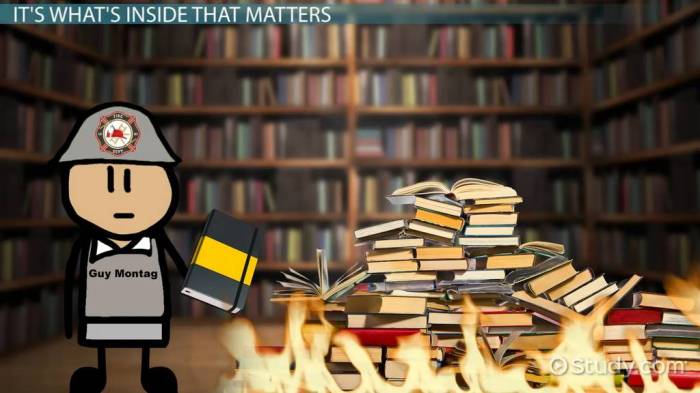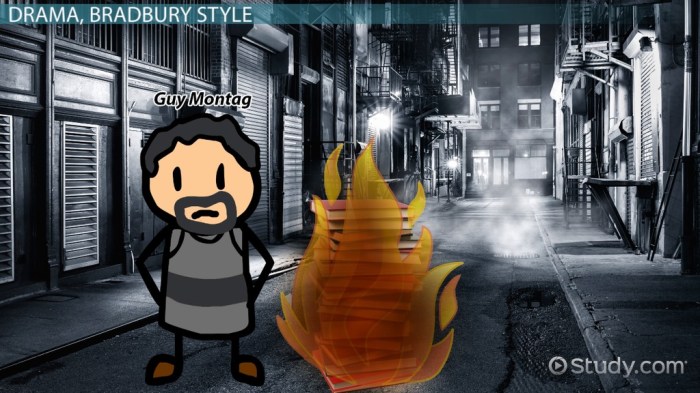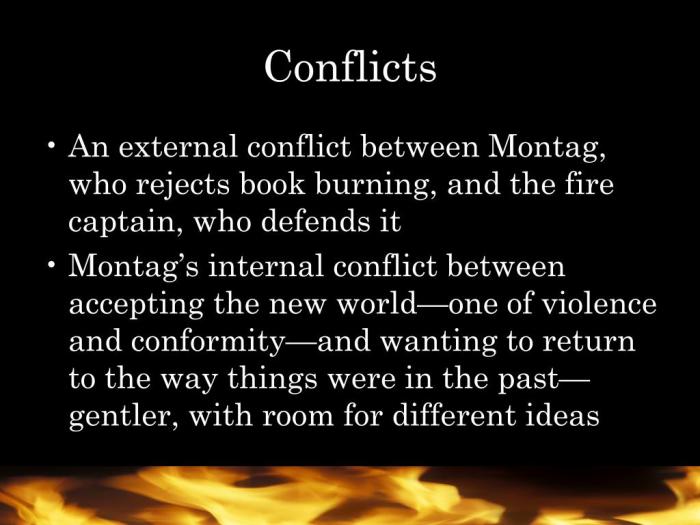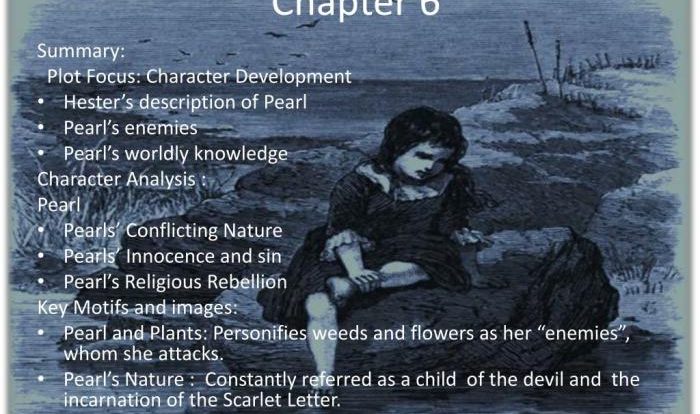Internal conflict in Fahrenheit 451, a seminal work by Ray Bradbury, is a profound and multifaceted theme that drives the narrative and shapes the characters’ arcs. This internal conflict manifests in both personal and societal realms, as individuals and society grapple with the complexities of censorship, conformity, and the pursuit of knowledge.
At the heart of the novel lies Montag, a fireman tasked with burning books in a dystopian society where reading is forbidden. Montag’s internal conflict arises from his growing disillusionment with his role and his increasing fascination with the forbidden world of literature.
This conflict sets him on a path of self-discovery and rebellion, ultimately leading him to question the very foundations of his society.
Montag’s Internal Conflict
In Fahrenheit 451, Montag’s internal conflict is a significant aspect of the novel’s exploration of themes such as censorship, conformity, and individuality. Throughout the novel, Montag grapples with his changing beliefs and values, torn between his initial acceptance of the oppressive society he lives in and his growing disillusionment with its ways.
Manifestations of Montag’s Internal Conflict, Internal conflict in fahrenheit 451
Montag’s internal conflict is manifested in various ways throughout the novel:
- Questioning the Status Quo:Montag begins to question the society’s values and norms, particularly its obsession with censorship and suppression of knowledge.
- Growing Disillusionment:As Montag delves deeper into the world of books, he becomes increasingly disillusioned with the superficiality and emptiness of his previous life.
- Fear and Hesitation:Montag struggles with fear and hesitation as he contemplates challenging the oppressive regime, aware of the risks involved.
- Torn between Loyalty and Rebellion:Montag feels torn between his loyalty to his profession as a fireman and his growing desire to break free from the society’s oppressive rules.
Specific Examples of Montag’s Internal Conflict
Some specific scenes or passages that illustrate Montag’s internal conflict include:
- Burning of the Old Woman’s House:Montag’s reluctance to burn the woman’s books and her subsequent suicide challenge his beliefs about the society’s values.
- Reading Clarisse’s Poetry:Montag’s encounter with Clarisse and her unconventional views prompts him to question his own beliefs and the superficiality of his life.
- Confrontation with Beatty:Montag’s confrontation with Beatty, his former mentor, highlights his growing disillusionment and determination to break free from the oppressive system.
Society’s Internal Conflict

Fahrenheit 451 presents a society grappling with an internal conflict between its desire for conformity and its yearning for individuality and freedom of thought.
This conflict is reflected in the novel’s setting, where the government strictly controls information and prohibits books, fostering a culture of ignorance and suppression. The characters, such as Montag and Faber, embody the struggle between societal expectations and personal desires, questioning the values of a society that stifles individuality.
Impact on Montag’s Internal Conflict
Society’s internal conflict directly affects Montag’s own internal struggle. As he begins to question the government’s oppressive policies and the emptiness of his existence, he grapples with the fear of societal retribution and the allure of conformity.
Montag’s decision to hide books and read them in secret reflects his internal conflict, as he balances his desire for knowledge and freedom of thought with the potential consequences of challenging societal norms.
Ultimately, society’s internal conflict serves as a backdrop for Montag’s journey of self-discovery and rebellion, highlighting the transformative power of individuality and the importance of resisting oppressive forces.
The Role of Books in Internal Conflict

Books play a pivotal role in Montag’s internal conflict, serving as a catalyst for his growing dissatisfaction and awareness of the flaws within society. They offer him an alternative perspective to the government’s oppressive censorship and conformity, challenging his preconceived notions and igniting a desire for truth and freedom.
Books as a Window to Truth
Through books, Montag encounters ideas and perspectives that have been suppressed by the government. The writings of authors like Shakespeare, Plato, and Bradbury himself expose the emptiness of his previous existence and the superficiality of the society he lives in.
As he reads, he begins to question the wisdom of the Firemen’s actions and the true nature of happiness.
“I don’t know what’s going on. I’ve been so busy burning books and not reading them. I’m beginning to think I don’t know anything at all.”
Books as a Catalyst for Dissent
As Montag’s understanding of the world expands, he becomes increasingly disillusioned with the oppressive regime. Books provide him with the courage to challenge authority and question the status quo. He realizes that the true crime lies not in possessing books but in suppressing the knowledge they contain.
“There is more than one way to burn a book. And the world is full of people running around with loaded guns in their minds.”
Resolution of Internal Conflict

Montag’s internal conflict reaches its resolution through a series of transformative experiences and interactions that challenge his previously held beliefs and values. His journey towards self-discovery and rebellion against the oppressive society he lives in marks a significant shift in his character arc.
Montag’s Transformation
Montag’s exposure to forbidden literature, particularly through his encounters with Faber and Clarisse, ignites a spark of curiosity and questioning within him. These experiences awaken his dormant intellect and empathy, forcing him to confront the emptiness and superficiality of his previous existence.
Furthermore, his interactions with Captain Beatty, the leader of the firemen, serve as a catalyst for his transformation. Beatty’s cynical and oppressive nature pushes Montag to question the authority he blindly followed, leading him to realize the true nature of the society he lives in.
Significance of the Ending
The novel’s ending marks a pivotal point in Montag’s resolution of internal conflict. His decision to join the “Book People” and preserve the remnants of literature symbolizes his rejection of the oppressive society and his embrace of individuality and freedom of thought.
Montag’s transformation and the preservation of books represent hope for the future, suggesting that even in the face of adversity, the power of knowledge and human connection can prevail.
FAQ Insights: Internal Conflict In Fahrenheit 451
What is the nature of Montag’s internal conflict?
Montag’s internal conflict stems from his growing disillusionment with his role as a fireman and his increasing fascination with the forbidden world of literature. This conflict forces him to confront his own beliefs and values, leading him to question the very foundations of his society.
How does society’s internal conflict affect Montag’s own internal conflict?
The societal conflict between the oppressive regime and the rebels who seek to preserve knowledge and freedom influences Montag’s internal conflict. He witnesses the suffering and injustice inflicted by the regime, which further fuels his disillusionment and propels him towards rebellion.
What is the role of books in Montag’s internal conflict?
Books play a pivotal role in Montag’s internal conflict. Through his encounters with literature, he gains a new perspective on the world and begins to question the values and beliefs he has always held. Books become a catalyst for his transformation and his journey towards self-discovery.
